 Petzlover
Petzlover Gaddi Kutta is originated from India but Pumi is originated from Hungary. Gaddi Kutta may grow 24 cm / 10 inches higher than Pumi. Gaddi Kutta may weigh 29 kg / 64 pounds more than Pumi. Both Gaddi Kutta and Pumi has almost same life span. Gaddi Kutta may have more litter size than Pumi. Gaddi Kutta requires High Maintenance. But Pumi requires Moderate Maintenance
Gaddi Kutta is originated from India but Pumi is originated from Hungary. Gaddi Kutta may grow 24 cm / 10 inches higher than Pumi. Gaddi Kutta may weigh 29 kg / 64 pounds more than Pumi. Both Gaddi Kutta and Pumi has almost same life span. Gaddi Kutta may have more litter size than Pumi. Gaddi Kutta requires High Maintenance. But Pumi requires Moderate Maintenance
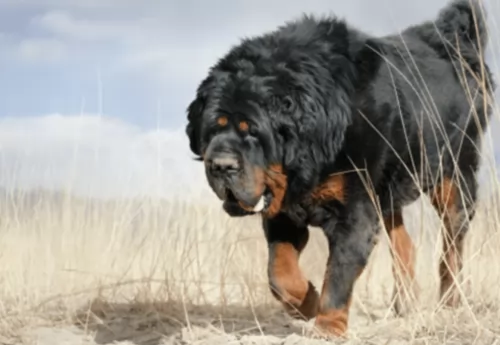 The Gaddi Kutta is mountain dog of the mastiff line from northern India. They are mostly found in the western Himalayas and Himachal Pradesh. It is also seen in Nepal and often named the Indian Panther Hound and the Mahidant Mastiff. They were bred to hunt but because of their strength and intelligence they are used to guard and herd goats and sheep. They are strong enough to defeat or scare off a panther or snow leopard and intelligent enough to work independently in finding strays and bringing them back to their pens. They have been known to protect herds of cattle from bears and leopards.3 or 4 of them working together can handle the guard duties for thousands of cattle.
The Gaddi Kutta is mountain dog of the mastiff line from northern India. They are mostly found in the western Himalayas and Himachal Pradesh. It is also seen in Nepal and often named the Indian Panther Hound and the Mahidant Mastiff. They were bred to hunt but because of their strength and intelligence they are used to guard and herd goats and sheep. They are strong enough to defeat or scare off a panther or snow leopard and intelligent enough to work independently in finding strays and bringing them back to their pens. They have been known to protect herds of cattle from bears and leopards.3 or 4 of them working together can handle the guard duties for thousands of cattle.
Their reputation precedes them – as ferocious and courageous, unmatched in their instincts to protect what is theirs. In the line of the Mastiffs and Molosser, the Gaddi is powerful and agile, and considered to be of ancient heritage though no one is sure what their origin is. The local myth is that dogs were crossed with tigers. It is more likely that dingo-like wild hounds from the Himalaya were crossed with the Tibetan Mastiff to create the Gaddi Kutti. Also found in Pakistan, most lines of the breed have been crossed with others including the German Shepard and the Bully Kutta. Outside of the Himalayas there are not many if any pure lines. The Gaddi Kutta is a good family dog if you socialize him as a puppy. He will be gentle, calm and intuitive with his family, but aggressive toward strangers and other dogs.
 The Pumi is a small to medium sized dog which comes from Hungary. They have always been used for guarding livestock.
The Pumi is a small to medium sized dog which comes from Hungary. They have always been used for guarding livestock.
It was in 2004 that the the Pumi was accepted by the American Kennel Club Foundation Stock Service program. Also in the country of the dog’s birth, the Pumi Club was founded, and in 2011, the dog was also accepted into the AKC into the Miscellaneous class and into the herding group too.
In the UK in 2015, the Kennel Club also accepted the breed standard
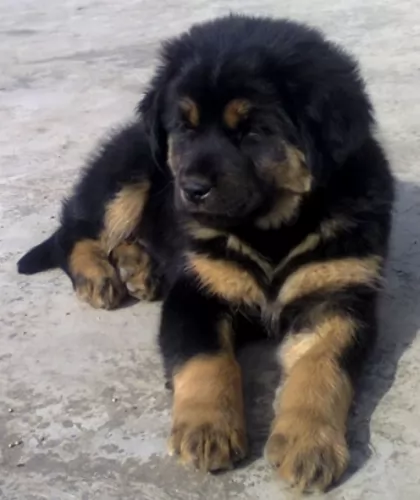 The Gaddi Kutta is a mastiff but he is athletic, has tremendous speed and stamina. He is muscular and deep-chested, leaner than most of the mastiff lines. Their ears can be either natural or cropped, on a very large head. One of the most important traits of the Gaddi Kutta is the massive, arched neck that protects them from predators. He is sturdy with a heavily feathered, thick tail curling over the back.
The Gaddi Kutta is a mastiff but he is athletic, has tremendous speed and stamina. He is muscular and deep-chested, leaner than most of the mastiff lines. Their ears can be either natural or cropped, on a very large head. One of the most important traits of the Gaddi Kutta is the massive, arched neck that protects them from predators. He is sturdy with a heavily feathered, thick tail curling over the back.
They are massive, wolf like dogs, fiery and huge but intelligent and faithful to their people. They are scary even when they are trying to be affectionate. The muzzle is strong, and the mane is thick. The Gaddi has long, heavy legs and very large feet that are feathered, making him even more intimidating.
There are two types of Gaddi Kutti – the longhaired and the shorthaired. The longhaired is the most common and has a fuller coat with long feathering on the tail, legs and chest and some feathering on the feet. They are all usually solid colors of yellow, fawn and cream or they could be piebald, brown or brindle. They have a woolly dense undercoat.
 The coat is a fawn, greyish silver or sandy color. The grey Pumi's are thought to be the more common color.
The coat is a fawn, greyish silver or sandy color. The grey Pumi's are thought to be the more common color.
The medium length coat is thick and curly with the top coat being fairly harsh to the touch.There is very little shedding. The dog has semi-erect, semi-floppy ears which are high set. The eyes are small and dark.
With his tight curly coat, his kinky tail and bright expression, you’d think the Pumi was just for entertainment and a playmate, but he is a serious worker too, loving to be busy, whether for work or play.
The Pumi is lively and bold and always ready for fun and action. He is intelligent too, and early training and socialization will be important to keep him manageable and a pleasure to have around. Because he is smart he won’t have trouble learning. They’re good with children and other dogs in the family.
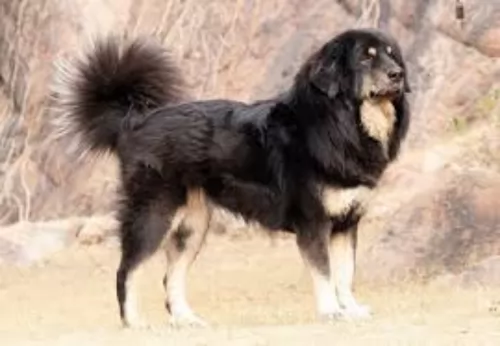 They are not always great with children, but they will protect own children in their family. Do not leave unattended.
They are not always great with children, but they will protect own children in their family. Do not leave unattended.
They have the ability to bring down a wolf or even a bear or snow leopard.
Because of his size, temperament and coat he is not very adaptable. He is good outside in a colder region and with a lot of land to roam, but not in a hot region or in an apartment.
This breed is very smart, learns quickly on his own.
 The Pumi is a comical looking dog which some people assume makes him a bit of a lapdog, but this isn’t true. Yes, he loves to receive love and attention from his human family, but he isn’t a lapdog.
The Pumi is a comical looking dog which some people assume makes him a bit of a lapdog, but this isn’t true. Yes, he loves to receive love and attention from his human family, but he isn’t a lapdog.
He likes to be busy if he can. He is smart and quick to learn and is affectionate, playful, loyal and loving.
His small size allows him to adapt easily to life in the city or the countryside, but he will need to be exercised. If you’re looking for a lively, amicable pet and companion, the Pumi can make an excellent family pet.
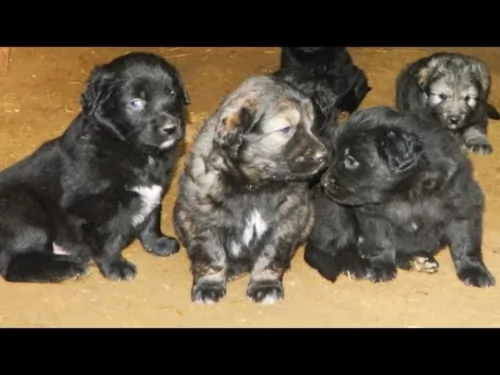 The breed is prone to obesity if they do not get enough exercise or a decent diet.
The breed is prone to obesity if they do not get enough exercise or a decent diet.
 With the Pumi, you’re really getting a robust little dog. With good care, he can push to 14 years of age and even much older. Of course, as with all other dogs, he is prone to some of the more common dog illnesses.
With the Pumi, you’re really getting a robust little dog. With good care, he can push to 14 years of age and even much older. Of course, as with all other dogs, he is prone to some of the more common dog illnesses.
Hip dysplasia is nearly always one that needs to be listed as it is really a common dog ailment that can lead to lameness.
This is an abnormal formation of the hip socket which in its severest form can lead to lameness. Luckily there are advances in veterinary medicine that make it possible for a dog with hip dysplasia to be happy and pain free.
This is an incurable, progressive disease which effects the spinal cord of your dog and is found mostly in older dogs. It’s very sad because as the disease progresses it can lead to loss of coordination in the hind legs, difficulty with supporting weight with the hind legs and also urinary and fecal incontinence.
This is an inherited disease that sadly might require you saying goodbye to your beloved 4-legged family member.
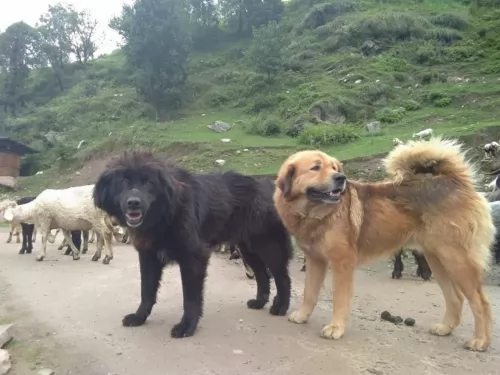 Should feed a high quality dry puppy food for large dogs. Give 1-2 cups per day split into 2-3 meals.
Should feed a high quality dry puppy food for large dogs. Give 1-2 cups per day split into 2-3 meals.
Again you want to feed high quality dry adult dog food for large dogs. Give 3-4 cups per day split into 2 meals. Watch for obesity and if your Gaddi Kutta is gaining too much weight, cut back.
The Gaddi Kutti seems to be immune to the most common of canine diseases.
This is a breed of very large dogs that need daily exercise by walking and running. However, since they have been fairly isolated in India and the Himalayas, he has not been exposed to organized dog play and exercise such as agility, dock jumping or field trials. He would probably succeed at all three.
 You can never be slack when it comes to choosing food for your pet. If you can provide him with wholesome food then you will be promoting health and longevity.
You can never be slack when it comes to choosing food for your pet. If you can provide him with wholesome food then you will be promoting health and longevity.
If you choose one of the commercially manufactured dog foods, make sure it is the high quality ones full of vitamins and minerals and free from all kinds of colorants and fillers.
Certainly provide him with some home-made food too, but keep it simple and tasty. An excellent home-made diet is boiled chicken, brown rice or pasta, sweet potatoes, carrots and spinach, all chopped up and mixed in twice a week with the dry kibble.
Every now and again, if you can afford it, you can also give him some raw meat added into the kibble. Plain and simple, your pet will thank you for providing him with an uncomplicated diet, gentle on his digestive system.
Make sure he always has a bowl of fresh, cool water available to him.
Energetic and lively, the Pumi is going to need regular exercise as well as mental stimulation. Show him a tennis ball and his eyes will light up as he just loves a game. Take him on a walk and include him in your ball games.
The Pumi’s coat is medium length and curly and he will need it combed to keep it free of matting. The coat will also need to be trimmed if you don’t want it becoming unruly.He isn’t a heavy shedder but will need his coat being attended to twice a week.